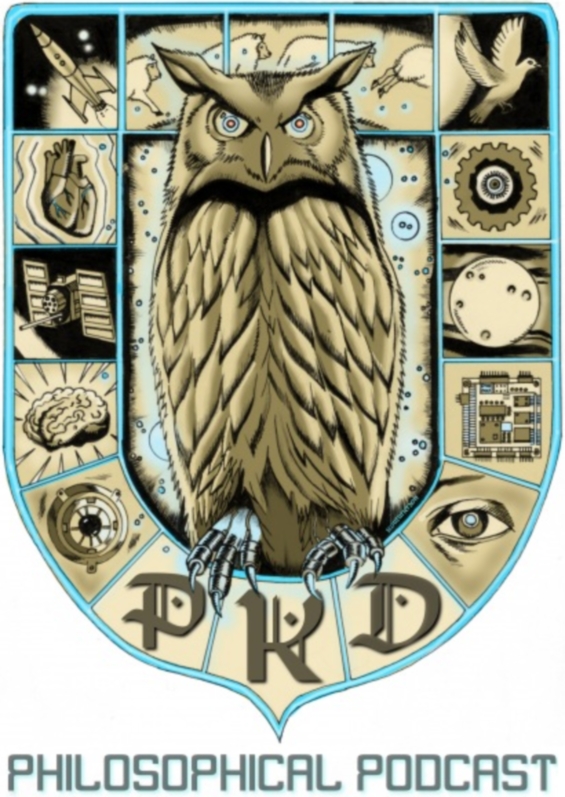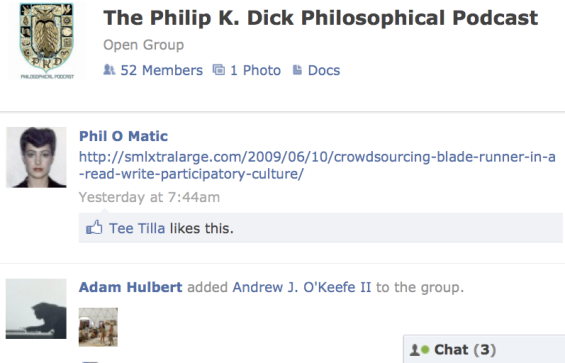
I’ve yearned for a podcast like this! For years, endless years. And now it is real! As real as their owl.
Do you like their owl?

Here’s the official description:
“Exploring the paranoid, hallucinatory future worlds of author Philip K. Dick. At the PKD Philosophical Podcast, we attempt to answer the important philosophical questions, like ‘how tasty are martian go-birds?’, and ‘why can’t androids dream of regular sheep like the rest of us?’ Each episode covers one short story, or part of a novel, starting with Philip K. Dick’s early short stories from 1952.”
I want to say that Adam Hulbert and Phil Young have done a pretty good job with the show so far. But my expectations are just too high. The show is just not fantastic, nor in any sense as definitive as I’d like it to be, at least not yet.
I will admit the logo is absolutely fantastic, as you can see above.
The audio itself is way, way overproduced, with added echoes and trippy (useless) sound effects.
Also, the website is buried, buried, on get this…. Facebook … YUCK!

But the ambition, the ambition! The potential for a podcast like this is terrific!
Now my main problem with the show, other than the extensive, unnecessary and frankly annoying sound design work, is the lack of homework done by the hosts.
For instance, in the first episode Adam and Phil lay down references to Ulysses 31, which was an early 1980s anime series based on The Odyssey that they apparently both saw. It’s a reference they both get and chuckle about and that’s it. I had to look it up. And maybe the connection is strong if you’ve seen the show. But I just don’t see it at all. Myself I’d have gone with the original, The Odyssey itself (particularity Book X which features a minor goddess turning men turn into pacifistic pigs). I’d relate a brief outline of the story and let that fuel the discussion. They don’t do that.
Adam and Phil ask a question about this line that comes near the end of the story:
“A very foolish thing,” it said. “I am sorry that you want to do it. There was a parable that your Saviour related—”
The guys are wonder which parable the wub was going to relate asking: “Could it be the story of Judas? Could it be the story of Lazarus?” Could it be the story of Cain and Able?” And I will admit that this is a ponderer. It definitely isn’t the story of Cain and Abel, that’s old testament guys – get it straight – they just let it all lie there as an unanswered question. They don’t even try to answer it. Terrible! Terrible! DO YOUR HOMEWORK GUYS!
Myself, when I read that line, I always think of Matthew 26:26 where Jesus suggest his disciples eat some bread as if it were his body (While they were eating, Jesus took bread, gave thanks and broke it, and gave it to his disciples, saying, “Take and eat; this is my body.”).
But that isn’t really a parable as much as it is a straight up metaphor. It’s closer to the parable form in John 6:35 in which Jesus says:
“I am the bread of life. He who comes to me will never go hungry”
That fits the story, but again it isn’t exactly a parable as much as it is a metaphorical statement. I like the “comes to me” part though.
Perhaps Luke 14:7-11, an actual parable, would be better:
When he noticed how the guests picked the places of honor at the table, he told them this parable: “When someone invites you to a wedding feast, do not take the place of honor, for a person more distinguished than you may have been invited. If so, the host who invited both of you will come and say to you, ‘Give this person your seat.’ Then, humiliated, you will have to take the least important place. But when you are invited, take the lowest place, so that when your host comes, he will say to you, ‘Friend, move up to a better place.’ Then you will be honored in the presence of all the other guests. For all those who exalt themselves will be humbled, and those who humble themselves will be exalted.”
The other idea I had was Matthew 8:28-33:
“When he arrived at the other side in the region of the Gadarenes, two demon-possessed men coming from the tombs met him. They were so violent that no one could pass that way. “What do you want with us, Son of God?” they shouted. “Have you come here to torture us before the appointed time?” Some distance from them a large herd of pigs was feeding. The demons begged Jesus, “If you drive us out, send us into the herd of pigs.” He said to them, “Go!” So they came out and went into the pigs, and the whole herd rushed down the steep bank into the lake and died in the water. Those tending the pigs ran off, went into the town and reported all this, including what had happened to the demon-possessed men.
I admit that I don’t know which of these parables, if any, Dick was actually referring to, but I at least did my homework. DO YOUR HOMEWORK GUYS! DO YOUR HOMEWORK!
Adam Hulbert and Phil Young also take a stab at the title’s meaning. This is a problem that vexes me too. Dick loved to use literary allusions, and he loved the word “beyond”. I’m betting Beyond Lies The Wub is a variation of some poem with a line reading “beyond lies the _______”. But I haven’t found that yet.
And then Adam and Phil talk about the name “wub” itself.
I’d say, wub = love. As in “I wub you vewy much.”
But where is the talk about Circe and her animals? That’s something Dick comes back to in Strange Eden. Where is the discussion of the visual pun of Peterson the captain and all the crew sitting at the table and eating? Get it? Peter-son? As in the disciple Peter at The Last Supper. Where is the discussion of the immortality of the soul? What the hell is an optus and why don’t you care? And more importantly, for a podcast about philosophy in PKD stories, where is the discussion of the metaphysics, ethics, aesthetics, and epistemology at work in this story?
Here are the first four episodes:
Ep1. Beyond Lies The Wub |MP3| –We discuss Philip K. Dick’s first published short story. Adam muses on the relative delectability of Martian go-birds, and Phil tries not to use the sweepings of his semantic warehouse to discuss space truckers. Readings by Stephanie Carrick. Music by A
Ep2. The Gun |MP3| –We discuss Philip K. Dick’s second published short story. Adam cautions on the dangers of basing romantic decision on fairybread come-downs, and Phil plays with hand-held nukes. Readings by Stephanie Carrick. Music by Adam Hulbert. Intro by Luke ‘voiceo
Ep3. The Skull |MP3| –We sidestep the vast reaches of space and delve into the exotic landscape of midwest America for some slem-gun-toting timetraveller-stand-offs at high noon. Watch yer don’t get yer truck shot full of holes… Readings by Luke ‘Voiceover’ Mynott.
Ep4. The Little Movement |MP3| –When good toys go bad! This episode we discuss Philip K. Dick’s story about a wind-up toy soldier revolution on 1950’s earth. And feature some of Luke ‘ Voiceover’ Mynott’s finest work to date…
Podcast feed:
http://www.weirdfictionrecords.com/pkdpodcast/pkd-pp-feed.xml
Posted by Jesse Willis
You’re all over this … as I knew you would be when I saw the title. You should be ONE of them! Obviously!
Far be it for me to insert myself into another person’s podcast, but they should at least … DO THEIR HOMEWORK!
Amen, amen to that! :-D
Also, the parable that came to mind is more of an allegory, but this is what I thought of:
Amen, amen, I say to you, unless a grain of wheat falls to the ground and dies, it remains just a grain of wheat; but if it dies, it produces much fruit. Whoever loves his life* loses it, and whoever hates his life in this world will preserve it for eternal life.
(John 12:24-25)
It is in being eaten that the intelligence (or soul?) of the Wub moves to the Captain. He is, in effect, an interplanetary Odysseus using beings as his ships. And I liked your point about Circe and the pigs … I hadn’t thought of that connection.
Anyway, I’m about halfway through. Most of the time these sorts of podcasts improve as others join in the conversation via forums or whatnot. It is one that definitely would benefit from your thoughts. :-)
Hi Jesse & Julie,
Great insights, and yep we are not PKD scholars, just enthusiasts who enjoy discussing these ideas. Nor are we veteran podcasters, as you’ve no doubt noticed. You’ll certainly get tenuous movie references, but I can’t deny being happy that we introduced you to the fine body of work that is Ulyssess31. The questions are out there for people like yourself to engage with so that we can all have a richer discussion of PKD’s work, we don’t come close to pretending we know all the references that are going on in this complex body of writing, and since dipping into the Exegesis that’s become even more clear…. I hope, alongside Julie, that the podcast will benefit from the contribution of such clearly thoughtful and passionate aficionados. Glad you took the time to engage with it at least, and if you can overcome Facebook dread it would be great to hear your insights into these stories.
Also, admittedly far superior to the podcast in its early form, you are right to note the logo. I’m a huge fan of the illustrator and honoured that he agreed to make the logo for us. His name is Jeremy and his website is http://couturierillustration.com/
I think it’s actually supposed to be the parable of the wicked vineyard tenants (which is an extension of Isaiah’s song of the vineyard). The tenants think they will solve the problem and get everything for themselves, by killing the owner’s son, but of course it just brings down vengeance on them so that they’ll lose everything. “He who falls on this stone will be broken to pieces, but he on whom the stone falls will be crushed.”
CAn you report EP 5 The defenders?